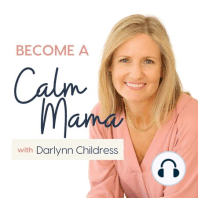28 min listen
Handling “I Hate You”
ratings:
Length:
29 minutes
Released:
Mar 28, 2024
Format:
Podcast episode
Description
Hearing your kid say, “I hate you” can be one of the hardest things to hear as a parent. Today, I’m giving you tangible, easy to apply strategies for handling “I hate you,” including ways to feel less upset by it and change the pattern. In this episode:Why kids say, “I hate you,” even though they don’t really mean itHow to protect your feelings Why saying, “I hate you” hurts your child, tooHow to change this pattern of behaviorYour child doesn’t actually hate you. They just don’t have the skill or language to describe their feelings in a healthier way (yet). Listen to learn how to give your kid better strategies for dealing with their big feelings and coach them toward emotional literacy.--------------------------------What Are They Actually Saying?When your kid tells you they hate you, it’s easy to jump to thoughts about how disrespectful, embarrassing and hurtful they are being. For the most part, kids don’t hate their parents. So, when they say, “I hate you,” what they’re usually trying to say is, “I hate this,” or “I hate this rule,” or “I hate this situation.”Your child is communicating their frustration, disappointment, anger or hurt about the circumstance they are in. The strategy they’re using is to blame you because, in their mind, you are what is blocking them from getting the thing they want. Handling “I Hate You”Of course, saying, “I hate you,” when they are disappointed is not how we want our kids to cope with negative emotion, so we will work to change the pattern. But we’re not trying to change the pattern because it’s disrespectful and rude. We want to change it because it hurts our child to communicate their emotion this way. It is not a healthy way to cope. What we may not always see is that after the “I hate you,” they also have to deal with guilt and confusion over saying that to someone that they really love. Our goal is to give them better tools to deal with discomfort and disappointment. Step 1: Get neutral (CALM)Start by reframing the statement. Remember that they are using that sentence to cope with discomfort or pain - a feeling that they don’t know how to deal with. Letting yourself know that it really isn’t about you will help you feel calm. Next, find the pattern that you want to change. Is there something that seems to trigger the “I hate you”? Maybe it has something to do with screen time rules or when you tell them they can’t have a treat. Step 2: Talk to your kid about the words (CONNECT)Your child might not have the words for what they’re feeling or why they are upset. Have a connection conversation with them outside of the “I hate you” moment. Share the pattern that you’ve noticed, and help them name the anger, frustration, sadness, disappointment, hurt, or whatever they might be feeling. Here’s an example: Hey, honey, I've noticed a pattern that when you get really mad about something, you say, “I hate you.” And saying, “I hate you” makes a lot of sense because you are really angry and you want to tell me that. Listen, I know you don't actually hate me because we love each other so much. I think you’re trying to say, “I hate this. I don’t like your rules. I don’t like when you say no to me.” Give them some time to talk here, to complain a little about their life. Create space for their thoughts and feelings to come up. Just listen. Don’t try to defend yourself or convince them of anything. If there is something you do in that situation that is really causing a problem for them, take responsibility and apologize. Step 3: Problem solving (LIMIT SET)This is where we teach...
Released:
Mar 28, 2024
Format:
Podcast episode
Titles in the series (100)
Pause & Reset Your Mind by Become A Calm Mama
